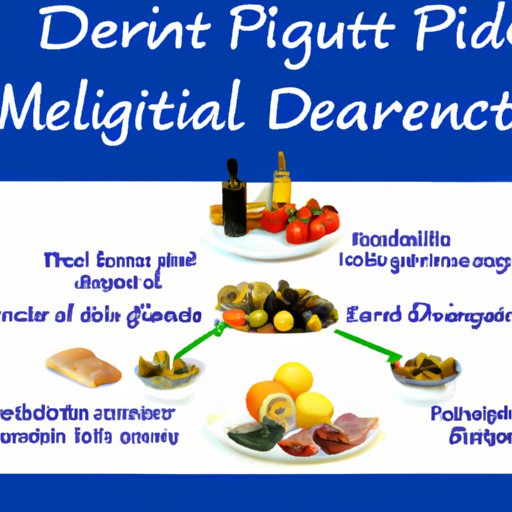Introduction
The Mediterranean diet has become increasingly popular in recent years due to its many beneficial health effects. The diet is based on the traditional eating patterns of countries surrounding the Mediterranean Sea. From Italy to Greece to Morocco, these countries have developed a unique way of eating that is both tasty and good for you. This article will explore what the Mediterranean diet is, how to follow it, and the science behind its benefits.
What is the Mediterranean Diet?
The Mediterranean diet is an eating pattern that emphasizes whole grains, fruits, vegetables, legumes, nuts, seeds, fish, and healthy fats such as olive oil. Red meat and processed foods are limited, and dairy products are consumed in moderation. This diet is rich in antioxidants and other phytochemicals that provide numerous health benefits.
The Mediterranean diet is also characterized by an emphasis on fresh ingredients and seasonal produce. Many dishes feature herbs, spices, and other flavorful additions to enhance the taste of the food. In addition, the Mediterranean diet encourages an active lifestyle, with physical activity being an important part of daily life.
There are several different types of Mediterranean diets, each with its own unique characteristics. For example, the Italian Mediterranean diet includes more pasta and pizza than other variations and has a greater emphasis on olive oil. The Greek version is known for its use of feta cheese and olives, while the Moroccan Mediterranean diet focuses on couscous, lentils, and tagines.
Mediterranean Diet Recipes
The Mediterranean diet is full of delicious and nutritious recipes. Popular dishes include hummus, baba ghanoush, tabbouleh, moussaka, and stuffed grape leaves. These dishes often feature herbs and spices like oregano, basil, cumin, and cinnamon, which add flavor and nutrition to the meal. Other common ingredients include tomatoes, garlic, onions, eggplant, and peppers.
When preparing Mediterranean meals, it’s important to keep in mind the importance of using healthy ingredients. Opt for whole wheat pasta or bread instead of white, and use olive oil or avocado oil instead of butter or margarine. Choose lean proteins like chicken, fish, or beans instead of red meat, and use low-fat dairy products when possible. Finally, don’t forget to add plenty of fresh vegetables to your dish.
Mediterranean Diet Meal Plan
Creating a Mediterranean diet meal plan can be a great way to ensure that you’re getting all the nutrients you need. A typical day on the Mediterranean diet might include breakfast of oatmeal with blueberries, lunch of a tuna salad wrap, and dinner of salmon with roasted vegetables. Snacks could include hummus and carrots, Greek yogurt with honey and walnuts, or a handful of almonds.
When planning your meals, it’s important to choose a variety of foods from all the food groups. Aim to eat at least five servings of fruits and vegetables per day, and incorporate healthy fats like olive oil and avocados into your diet. Incorporating lean proteins such as fish, eggs, and beans is also important, as well as whole grains like quinoa, oats, and brown rice.

How to Follow a Mediterranean Diet
Following a Mediterranean diet doesn’t have to be complicated. Here are some general guidelines to keep in mind:
- Eat a variety of fruits and vegetables every day.
- Incorporate healthy fats such as olive oil, avocados, and nuts into your diet.
- Limit red meat and processed foods.
- Choose whole grains over refined grains.
- Include lean proteins like fish, eggs, and beans.
- Stay active and get regular physical exercise.
The Science Behind the Mediterranean Diet
Numerous studies have shown the benefits of following a Mediterranean diet. One study found that people who followed a Mediterranean diet had lower levels of inflammation, as well as lower risk of heart disease and stroke. Another study showed that the diet was associated with a lower risk of cancer and diabetes.
The Mediterranean diet is also high in vitamins, minerals, and other nutrients that are essential for good health. It is rich in fiber, which helps keep you feeling full longer, and also contains healthy fats that can help reduce cholesterol levels. Additionally, the diet is low in saturated fat, which can help reduce the risk of heart disease.

Eating Out on the Mediterranean Diet
It’s easy to find restaurants that serve Mediterranean-style food. Many Italian, Greek, and Middle Eastern restaurants offer dishes that fit within the parameters of the Mediterranean diet. When dining out, look for dishes that feature whole grains, lean proteins, and lots of vegetables. Avoid dishes that are fried, covered in cheese, or high in saturated fat.
When ordering, ask for dressings and sauces on the side so you can control the amount you use. Also, ask for olive oil to be used instead of butter or margarine. And don’t forget to order a side of vegetables or a salad to round out your meal.
Conclusion
The Mediterranean diet is a delicious and healthy way of eating that can provide numerous health benefits. It features whole grains, fruits, vegetables, legumes, nuts, seeds, fish, and healthy fats. Studies have shown that following this diet can reduce inflammation, lower the risk of heart disease and stroke, and even reduce the risk of cancer and diabetes. With its tasty recipes and healthful benefits, the Mediterranean diet is a great way to improve your overall health.
(Note: Is this article not meeting your expectations? Do you have knowledge or insights to share? Unlock new opportunities and expand your reach by joining our authors team. Click Registration to join us and share your expertise with our readers.)
